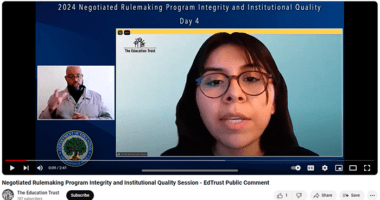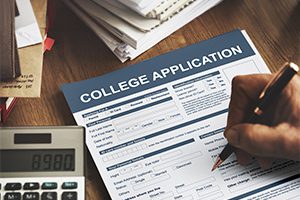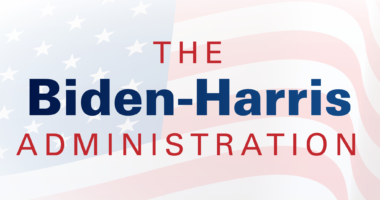Here’s How to Strengthen the Gainful Employment Rule
UPDATED
Students traveled to Capitol Hill last week to tell Congress the hardships they have faced because the career education programs in which they were enrolled left them with nothing more than high debt and little, if any, real career preparation. Unfortunately, we know far too well that their stories aren’t unique. Students all across this country enrolled in predatory career education programs have similar experiences.
Syreeta, a former student of Kaplan University, told me via email, “Use my story to address the issue of exhausting student loans due to highly profitable schools who do not care one way or another if you receive your degree or not. The end result is high student loans that are required to be paid back and not affordable. In my case, my monthly student loan payment is over $700 a month and on top of that, I still do not have a degree and do not know if I will ever be able to finish to get it.”
Students like Syreeta deserve quality career education programs that lead to a credential and a job that will allow them to repay their debt. But as it stands, the gainful employment rule — a federal regulation that seeks to establish minimal standards of cost and quality for hundreds of career education programs nationwide — fails to protect students like Syreeta. That’s why Ed Trust is submitting public comments this week that urge the U.S. Department of Education to strengthen this proposed gainful employment rule. In the meantime, here’s how we think the rule could be stronger:
- Provide relief to students in programs that lose eligibility. The proposed regulation tips the scale toward protecting institutions more than students. To help rebalance that scale, programs that are in danger of becoming ineligible at the end of an academic year should be required to post a letter of credit or agree to set aside a portion of their Title IV funds to provide borrower relief to enrolled students.
- Limit enrollment in poorly performing programs until they improve. Under the proposed regulation, poorly performing programs can increase the number of students they enroll, without limit, up until the day they lose eligibility. The rule should, instead, cap the number of students who can enroll or the amount of federal financial aid these programs can receive from the moment they are found lacking.
- Include a metric to effectively prevent programs with high borrowing and high dropout rates from receiving federal funds. A low completion rate is one way programs can fail to prepare students for gainful employment, particularly when they leave school with substantial debt. The final regulation needs to have a separate metric that addresses programs that have high borrowing and high dropout rates, prohibiting programs from continuing to draw federal aid if more of their students default than earn degrees.
- Protect low-cost programs where most graduates don’t borrow. Low-cost programs with few borrowers — many of which are offered by community colleges — should be exempted because, by definition, these programs do not consistently leave students with unaffordable debts. Burdening these programs with a complicated appeals process to prove this could result in the unintended consequence of pushing schools out of the federal student loan program, eventually leading to the closure of effective, low-cost programs.
Including these four changes in the final rule will show that Washington has been listening to students. The students who seek postsecondary education are serving their country’s interest by trying to become better educated and financially independent. In return, they deserve a federal government that protects them from harmful career education programs.
Submit your own ideas to improve the proposed gainful employment regulation by next Tuesday, May 27.
This post was updated to include a hyperlink to Ed Trust’s submitted comments on the proposed gainful employment rule.












